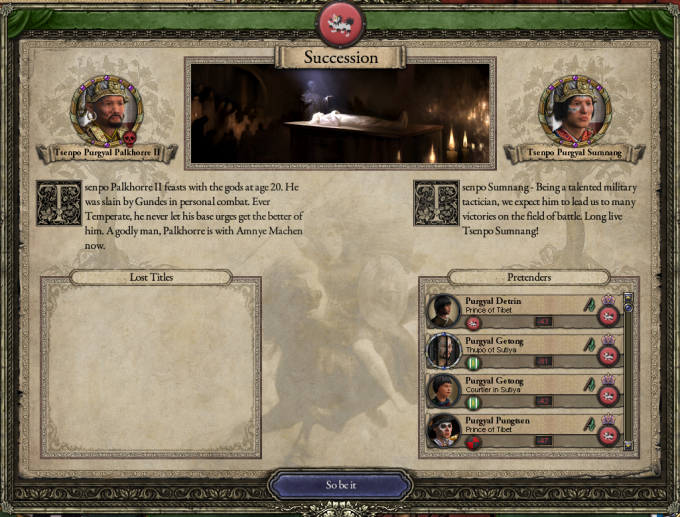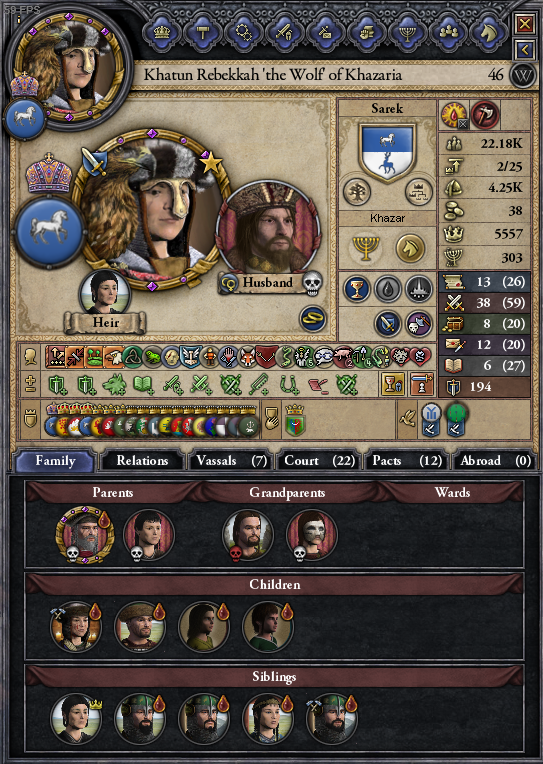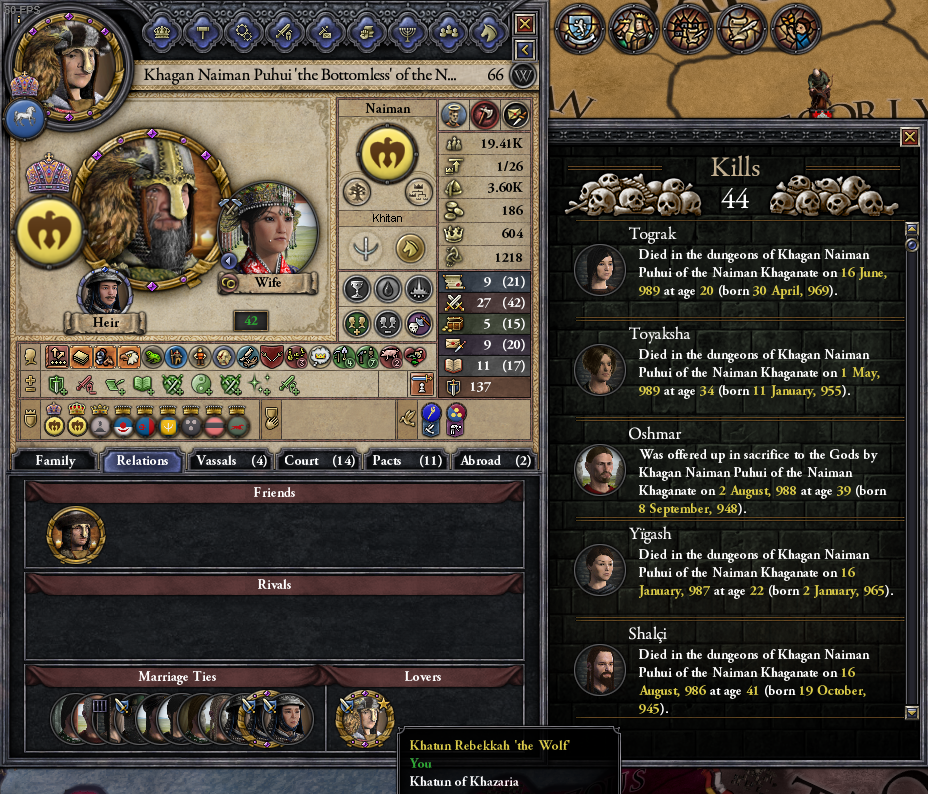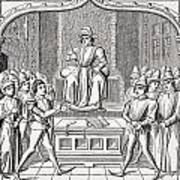|
Chapter 13: 963 to 974 - Tsenmo Purgyal Trinle 'the Glorious' 国破山河在 "The country is broken; the mountains and rivers remain." -Spring View, Du Fu After the holy war to claim Bihar concluded, one could credibly assume that Tibet would be free, prosperous and stable and that the era of its uninterrupted military victories would continue into the immediate future. Tsenmo Trinle had inherited an empire and a standing army assembled by her great-aunt, and she was able to wield these tools with some competence. The war against the Pala was portrayed as an event comparable to the great conquests of her esteemed ancestor. However, her immediate rise to the top left other nobles - especially those in other branches of her family, with a deep and burning resentment. All seems well. The country is peaceful, the administration of the government continues. The sacred hierarchy is active in standardizing its beliefs and correcting mistakes. In the tenth decade of her life, the Archpriestess Tse makes the time to pass down her wisdom to future generations. Fine meals, horses, other luxuries. The distant forts and settlements in the Pamir range are reorganized under a single ruler. Trinle dabbles in the sport of falconry. She backs down after starting with too large and unruly a bird, which soon attacks her when she was inattentive. She hands the bird over to a more experienced handler and instead tries her hand at poetry. Wars elsewhere. They don't happen here. Not in decades. More children. Trinle's younger sister, Yon, has become enchanted with the idea of traveling to the Jin Dynasty as part of a diplomatic mission. The journey goes about as well as any of us could have expected, due to Yon's diplomatic abilities. When Yon asks to stay there permanently, Trinle cannot but indulge her. She is not so worried about the Jin. The Pratihara, on the other hand, have subjugated the Rashtrakutras to the south, and are well and truly masters of India. To that end, Tse kindly suggests that Trinle learn some of the languages spoken in the Jin. Trinle agrees. She makes arrangements to introduce her son, Palkhorre, to court and have him play a larger role in public life and major ceremonies. The two have a strong and sincere relationship, and Trinle is devoted to him. That was how the court appeared to be. Stable, diligent, scholarly, content. Trinle is a touch stressed from the work that is involved in running an empire of such size, but in peaceful times it seems manageable. Not even ten years after the great Gyalyum had passed away, that peace came to an end. A group of nobles led by the vassal king of Nepal demanded further rights and privileges for themselves, and at the great expense of the power of the empress and the Sacred Hierarchy. They resented the concentration of power in Lhasa, as well as the interference of the Sacred Hierarchy in 'inviolable' and 'eternal' religious traditions. They demanded further power as part of a pushback against the structures that Gyalyum had built, and what she had held together. Also notable among the rebels was her younger brother, Getong, who felt he was looked over after seeing how many lands and titles were passed directly to Trinle. Trinle refused. It was war. The rebels controlled Nepal, Kosala, some of the lands of the old Zhangzhung, thus occupying some of the poorest and some of the most prosperous lands of the Empire. Every noble and chief still loyal, no matter how distant, was asked to contribute troops to the defense of the realm. Trinle herself leads the standing army to defeat a rebel detachment near Shigatse. Almost immediately, the rebels take and sack major strongpoints held by loyalist forces. Pataliputra is the first to fall, then followed by the old Buddhist monastery of Odantapuri. Trinle, with caution, sends her army further west, defeating an isolated force at the fortress of Lhatse. Her bravery in that battle is enough for the soldiers to make comparisons to her distinguished ancestors. She will lead them to victory. They have another divine leader. That is what they believe. Another isolated detachment fumbles its way through the mountainous terrain and attacks her entrenched army near Gyirong. Another victory, though Trinle sees one of her best and most loyal generals die by accident. Then to the center of the rebels' activity, Kathmandu. At first, the loyal forces push back the rebels easily, but then they are attacked from a second direction by reinforcements. Trinle attempts to rally her army to defend on two sides. In a lull in the fighting, she turns to rally her troops and is struck in the head mid-sentence by an arrow. Incredibly, she survives. Her troops call it a victory. But it led to a dramatic setback. After the battle, Trinle ordered the entire army dig in to besiege Kathmandu. There were too many troops in harsh conditions, and with not enough crops or animals to forage from. Fully a third of the army, including the elite of Gyalyum's old permanent army, was dead within months. That was when the main rebel army attacked. The loyalists held fast. Again, nearly half of the army was lost. It was at that point that a group of nomads invaded the Tarim Basin. The loyalist army fled back to Tibet to recover, while the rebel army ran wild with loot and plunder in Bihar. On October 17, 969, the Archpriestess Tse passed away. She had fared badly from a knife wound received in the latter Battle of Kathmandu and soon slipped away. In her last moments, her eyes shone wide, and she gasped out "Your Majesty! I see you!" Then she breathed her last. Trinle had recovered from her own grievous wound. While she suffered from persistent, debilitating headaches, she was still alive, and no less determined to see the war to its conclusion. Even if that end was a long way off - the nomads were running wild in the Tarim Basin, with Yuni and Ruoqiang falling in a matter of days. Trinle combines the remaining armies, hires some mercenaries, and then heads to Kushinagar to recover cities and fortresses lost. At this time, a major epidemic of consumption was spreading through the Pratihara Empire, which was then suffering through its own civil war. That plague had just started to bleed through into Tibetan Kosala. Both loyal and rebel armies flee to the south, with the rebels just over the Ganges and the loyalists right after. The bulk of the rebel army is overtaken and defeated at Rohtasgarh. After that, a march north to defeat another detachment in Nepal, near Gograha. Now, time to besiege the holdings of the rebellious lords. This time, they are spread out enough to avoid disease or famine. At this point, however, the northern invaders have won; they have pillaged nearly every major settlement in the southern rim of the Tarim Basin, and they have settled, perhaps permanently, near Yuni. Still we are beset on all fronts. In the very west, at Danyor, the frontier towns and trading posts are sacked. While leading the siege, Trinle feels a rush of fear as she notices a suspicious rash along her arms and back, But then escapes death again as it was just a rash. After a few cities and fortresses are taken, the army pursues another detachment of rebels, catching them in Mustang. Victory. Trinle is a changed woman after this war. She feels a sense of compassion and pity towards her neighbors and those who are persecuted for their faiths. Yet not so changed that she is not above allowing her troops some revenge after a rebel stronghold is taken. In the west, she hears stories of a great warlord, who has won a great victory against her neighbors. Yet another threat to worry about. Something to think about after the rebels are finally defeated. The days go on in the same bloody way. The war is finally won, after six years. The lands are fallow, the armies are devastated, the treasury nearly empty. But the rebels are defeated, and Trinle thinks she has prevented another Era of Fragmentation. Well, perhaps not yet. Rebels against the church still fight, and she rides out against them. She decides to handle the internal threat, the Turkic rebels who still occupy much land and have conducted interminable raids against her for years. She gathers the army and rides out against them. A promising start. It seems they're not used to an opponent that fights back. Yet the troubles do not cease. She receives word that her second son, Sumnang, has fled the empire and is raising troops for another rebellion. This is too much to bear. First the lords, the nobles, the nomads, the priests, her brothers, and now her own children. She stays up at night, wandering the tents and the fields, tearing her hair out over the fatigue. One night, in February 974, she tells her guards and retainers that she will be awake all night handling papers and affairs of state, and not to disturb her. Nothing out of the ordinary. She is found dead in her chair the next morning. Kangxi fucked around with this message at 15:05 on Jun 29, 2019 |
|
|
|

|
| # ? Apr 26, 2024 13:37 |
|
Danny Glands posted:Calling it now - Tsenmo is going to gain the Stressed trait. Called it habeasdorkus posted:I hope Tse lives to 100, and then vanishes in a puff of smoke with echoing, evil laughter. She's a demon in a woman's skin! She will kill our young leader, don't you dare doubt it! 97 is close enough, right?
|
|
|
|
 You deserved better, Trinle. You deserved better, Trinle.Hopefully that second son doesn't start any trouble with the succession...
|
|
|
|
Here lies Trinle, she struggled and died
|
|
|
|
Was kind of hoping for a little bit more stability than this before it all started falling apart...
|
|
|
|
Kangxi posted:97 is close enough, right? I don't believe she's dead.
|
|
|
|
Your writing style makes these updates so loving tense. I genuinely never know if the next picture will be a glorious victory or the beginning of the end.
|
|
|
|
Chapter 14: 974 to 980 - Tsenpo Purgyal Palkhorre II / Tsenpo Purgyal Sumnang 'The Sword of Shinje' The Memoirs of Gierjïhæi (吉爾吉黑錄) were an autobiographical manuscript written by the Empress Zhenxian (禎獻皇后). The manuscript, written in elegant literary Chinese, provides a valuable insight into the political concerns and self-perceptions of the Jin court, as well as a description of the Empire of Tibet, then referred to 'Tubo' by the Jin. The memoirs were written in multiple parts over many years, each with a different description in mind, and as such scholars as Xu and Jin have attested, a different political purpose. The book loses some degree of royal etiquette in translation, as the Empress Zhenxian drops or ignores royal or familial titles for people she personally dislikes, and only retains them for people she personally respects in some manner. Part I When I was a young girl, I wrote letters to my siblings in the palace. I delighted in the beauty of my calligraphy, which was like moving clouds and flowing water. But my grandmother, the late esteemed Empress, was not satisfied with this, and how I left too many letters describing my plans and where I hoped to travel. "What if your letters were stolen?", she told me one day. "You could be found and kidnapped. Rebels or angry peasants or the barbarians could do horrible things to you, or hold you hostage. Then where would we be!" She did not inflict any harm upon me but she had the eunuchs wash the ink off the parchment and reuse the paper. I write this now, far away from her or anyone else in my family, and I write in the hope that nothing I write shall be washed aside. ------------------------------------------------------------------- I knew very little about Tubo when I was younger. I knew, mostly from overhearing the eunuchs and emissaries reports, that they were in a state of internal turmoil. I knew that their last zan-mu had died from overexertion and that the new zan-pu, a man named something like 'Ban-kuo'? I don't remember. He was the oldest son of their last zan-mu, only twenty years old by our reckoning. I knew that his wife was a great Mongol Khatun, a political marriage. I knew that they were engaged in a long conquest of Tianzhu, just as decades ago, our Great Ancestor, Feicen, conquered this land and established our own dynasty. The tutors taught us of our customs, and of the Jurchen language, yet we were also emperors of this land, and had to learn the language of the Han. Some of the noble clans had married freely with some of the more prominent Han families, and I was aware that these families were happy and prosperous. But my grandmother insisted that we learn our Jurchen, and write it as well. I knew that the westerners had clung to their faith - the worship of ancestral spirits and centered in a great temple, all taking the orders of a single great priest near Lhasa. I found such beliefs intriguing and I wondered how that would be the same as Laozi's injunctions about acting in nature. [OOC: The title Dalai Lama does not make sense at all as a leader of the Bon - Dalai is a Mongolian word and Lama is pretty strongly associated with Buddhism.] But for the Tibetans themselves, they were always either trying to invade and pacify some other people, Or suppressing Buddhist rebellions. They are a tenacious people, aren't they? The Tang Emperor, Wuzong, punished them severely, and look at what happened to him and his dynasty, and so we the Jurchens overthrew them. Are we yet the instrument of 'karma'? I have heard only rumors about their theology and beliefs, and I confess I don't entirely understand such things. A ruler always has to find the right ways in their conduct, as my grandmother said. She told me a story of a great chief who had called in two of his sons as successors, to see how they would rule in his stead. He had his servants hand them two songbirds. The first one held the bird too tightly, and so he squeezed it to death. The second one, who was terrified he'd make the same mistake, let the bird go. He looked at them with disgust and then asked for a bird of his own. With great care and deliberation, he plucked all of the bird's feathers off and then opened his palm wide. "You see," he instructed them, "now it is grateful for the warmth of my hand." I did not understand that story when she told it to me. Now maybe I do. It was like that book she always carried around with her - the Thirty-Six Strategems. She fiddled with it like the Buddhists clutched their prayer beads. How to deceive, how to play the fool, how to prevent others from understanding what you're thinking. And in the very end - 'If all else fails, retreat.'  When we heard that their new zan-pu was slain, three months after the death of his mother, my grandmother said only one thing, perhaps to put on his memorial stone: "What, already?" I was told that their new zan-pu was a brute, named Song-nang. He had been hiding in the countryside when the envoys from court told him he was their leader now. Grandmother did not have a high opinion of him. She said, "I'd rather have met his great-great-aunt," she told me. "She would have been interesting to talk to." "There are many conquerors in the annals and old chronicles. Just good at killing things or hunting with a bow and arrow." "Qin Shihuang, Wu of Han, all those emperors. Now this Seljuk in the far west, campaigning through Persia." "Maybe a man like Cao Cao was a good poet. But Wei is gone. And now this Gyalyum comes out of nowhere and writes her book of laws. She builds a church. What kind of conqueror does that? One who thinks about the future." "The Han resent us and call us barbarians. We invaded them, don't ever forget that, and we'd hate them if they took over our ancestral lands. But we must be victorious. Force is the only thing to overthrow dynasties, don't ever forget that. But we have to make something else, not just burn down all their temples and forts. We have to have some civilization." Our diplomats and ministers heard of their conquest of Gaya from the nomadic barbarians, a major blow to both Buddhist and Jain. It appeared that they were finally emerging from that cycle of instability which had plagued them for almost ten years now. Their fields would grow, their treasury would be filled again. This ruler was a real brute, sure, probably illiterate, barely civilized, but he could hold his kingdom together. Even if he did develop indiscreet relations with his fellow warriors, He was at least willing to acknowledge what he had done and follow the bare precepts of ritual. Perhaps it was a kingdom that we could talk to. My grandmother may have decided to negotiate with them, but that was not the case. After nearly four decades of rule, the late Empress passed away and my father, who later took the era name Shengzong, ascended the throne. My late grandmother had been blessed with many children; my father had been blessed with five legitimate children. The Tibetan royal family, on the other hand, struggled to have one healthy baby. The doctors told me of things like the body shifting from a warm yang state to a cold yin and how the mother loses much of their life force and bodily essence as it is transferred to the baby. Such talk makes me shudder. Believe me, I would pray to any god or spirit that made all of that less painful. Or if I didn't have to do any of that and I just found a child in a flower bed like those old stories. But it would be too easy to become conceited and overproud otherwise. Understanding the divine and its mysteries keeps one humble. There's more of the world out there than what I hope to know. The Seljuk Turks, as they are now called by our foreign ministry, have stalled after the death of their chief in battle, an infant rules in his stead. I really do wonder: what infant can already be called glorious? What have they done? The Tibetans, for their part, have some achievements. They have the city of Varanasi now, after their vassal king in Kosala took it from the nomads. Temples to the god Shiva and Buddhist monasteries. All theirs now. They at least have some cause to think that they have divine favors. Their king, Sang-nang, could spend his time playing games of chance and skill. Chaturanga and Chaupar, enough opportunities to gamble. He fires his chief general for being suspicious and then promotes his wife to take that spot. Move everyone around like those little pieces. In 979, the third year of his reign, my father died. His successor was my oldest sister, with the reign name Jingzong. She had a fondness for the peoples of the Tarim Basin and Central Asia, and of their faith which promised a grand struggle between good and evil. She surrounded herself with them, populated the court with them. That, in turn, made her sympathetic to their plight, and often more dismissive of the western Tibetans. I remember her shooing a few ambassadors and visitors out of the court, and of the wounded and sorrowful looks on their faces when they left. Even the aunt of their current zan-pu was among them, and I wanted to say something to her, but I could not. She openly ridiculed the news that the Imperial couple in Tibet were feuding over faithfulness in their marriage. "Those vicious little hill people cannot keep their own house in order," she told me over dinner once, "How are they going to hold a dynasty together like this?" Shortly after, their ambassador had approached our court with a request - could they have the unparalleled and distinguished honor of marrying a member of our most esteemed and honorable family? My sister had kept a straight face very well. At first, she thought the idea ridiculous. But later, she gave it serious thought, especially after her ministers told her that an "appeal to their pretensions" was a good diplomatic move and that this flattery would be enough to convince them to avoid any costly wars. But she wouldn't do it herself, of course not. My youngest sister was already betrothed to the head of the Cumans. So that left me. My sister took me aside and explained to me my duty as a member of the imperial family. What etiquette I had to follow and what rules to follow, how to behave like an empress, and why I had to do this - to preserve peace between two states, and prevent barbarism from overtaking civilization. I listened and said nothing. She was not technically required to do all that, but I had no choice in the matter. She was the empress, and an order would have been enough. But I think that she showed some filial affection to me in this way. And that is how I, then sixteen years old, was sent along with a baggage train and a company of attendants, to Lhasa. It would be the first marriage between a Chinese and a Tibetan royal family in three centuries. The servants grew tired as we headed further into the mountains; I think the air itself is different here. I had my books, poetry, brushes, inkstones, silks, enough jewelry to last. I was then young, shy, and naive. I had entered a strange land, perhaps on the edge of recovering its prosperity, and I had no understanding of what the future held. Kangxi fucked around with this message at 04:56 on Jul 1, 2019 |
|
|
|
 This is an incredible typo.
|
|
|
|
Is "Palkhorre" just a cursed name for rulers or something? Both Palkhorre and Palkhorre II died pretty quickly, but at least Palkhorre II didn't poo poo himself to death.
|
|
|
|
Mr.Morgenstern posted:
I am the greatest doofus under heaven, it's me Minus Green posted:Is "Palkhorre" just a cursed name for rulers or something? Both Palkhorre and Palkhorre II died pretty quickly, but at least Palkhorre II didn't poo poo himself to death. Probably. The very first Palkhorre was Yumtän's son, and he died in battle in his 20s. That's how succession went right from Yumtän to Gyalyum.
|
|
|
|
 Marco Polo is going to arrive and discover that literally every square inch of Asia, from Turkey to Japan, is Tibet.
|
|
|
|
Are all of our male rulers going to be secret heretics?
|
|
|
|
Minus Green posted:Is "Palkhorre" just a cursed name for rulers or something? It is now.
|
|
|
|
edit: Whoops wrong thread. So what would be an appropriate name for the head of reformed Bon, if the Dalai Lama is inappropriate?
|
|
|
|
Bön Mot.
|
|
|
|
I predict this Chinese princess is gonna inherit the will of Gyalyum
|
|
|
|
Xelkelvos posted:I predict this Chinese princess is gonna inherit the will of Gyalyum The trait between "Quick" and "Sympathy for Pagans" suggests she already has 
|
|
|
|
NewMars posted:So what would be an appropriate name for the head of reformed Bon, if the Dalai Lama is inappropriate? In our timeline, the head of the Bön lineage is called the Menri Trizin, or Abbott of the Menri Monastery. That monastery was built in the 14th century, however, which is near the tail end of Crusader Kings 2. Considering the Bön Sacred Hierarchy in this game owns Medog and Mainling counties, I'd hazard a guess their religious head would be named after a building or monastery complex in that area. So they might be called Lamaling Trizin, Pemako Chung Trizin, Qiangna Trizin, etc. Most of those were built later in our timeline but we've left that timeline long ago.
|
|
|
|
sounds like we need to build a great temple to house our religious head
|
|
|
|
MaxieSatan posted:The trait between "Quick" and "Sympathy for Pagans" suggests she already has Until the revenant ghost of Tse murders her.
|
|
|
|
This thread is going places. I just know it.
|
|
|
|
habeasdorkus posted:Until the revenant ghost of Tse murders her. Don't you mean Possess her?
|
|
|
|
Xelkelvos posted:Don't you mean Possess her? Why not both? In either order.
|
|
|
|
Chapter 15: 980 to 990 - Tsenpo Purgyal Sumnang 'The Sword of Shinje' The Tsenpo Sumnang, briefly satisfied with war, decides to focus his energies on raising his children, especially his oldest daughter. In peacetime, the discipline of the standing army has grown lax, and the principal commanders are now dueling each other in public contests instead of tending to their business. The Jin continue their campaigns to subjugate the northern barbarians. They have advanced against a Kazakh group which resides along the northern edge of Lake Balkhash. They have already made considerable progress - peoples from the northern edge of the Taklamakan desert to the Altai mountains are already paying tribute. The Tibetan vassal kings, for their part, remain autonomous and ambitious - the King of Bihar has expanded south to Raibania and Kataka. The Empire of Tibet, for the first time in its centuries of existence, now has access to the ocean. The Tsenpo, given to changing his mind almost at random, grows envious of the successes of others. He decides to advance against the Pratiharas, who are still dealing with plagues and civil war. He does not move against their more populated areas such as Delhi, nor Gandhara, which would give him access to the Indus River, nor does he decide anything close to the Ganges, but instead settles for the sparsely populated and mountainous area called Uttaranchal. His suspicion of others extends to his empress consort, whom he suspects of having had affairs with men. He pays a maid to keep an eye on her. The maid, smiling and blushing after discussing such a sensitive topic as the patronage of the imperial family, says, "no, she has never had any affairs with men." And he is satisfied. And with his mind clear, he immediately begins courting his own Lonchen, Mra Konchog 'the Ruthless'. Around the time his armies take their first major settlement, The Jin armies have announced the surrender of an enemy khan. His suspicions taken care of, Sumnang gives leeway to her servants to prepare whatever food she asks for. The cities fall one after the other. There is no sign at all of the Pratihara army. Sumnang grows bored during the long sieges and spends extra time with the servants. News of a son from Lhasa. Nothing to stop them. Nothing at all. For all the rumors he has heard of warriors and disciplined valor, and they have seen nothing. The Pratiharas, still entangled in their civil war, let him have the land without any fight at all. He wonders if he could have gotten more. Whatever. He is sure to let her have the maids and servants that she asks for. A brother of his has the idea of journeying to the lands of the Jin, but the Empress Consort persuades Sumnang that sending his father would be a better idea. A daughter is born. She is named after his dear mother, gone too soon. The imperial household acquires a eunuch, a former architect by profession. He soon becomes acquaintances with the Empress Consort, herself far from home, and they, through several translators, discuss their travels and the home they miss dearly. Sumnang's father returns from Jin, having visited several provincial capitals and met regional governors. He has even brought home some artwork - not a painting or calligraphy, unfortunately, but a decent piece of woodwork. Most of the stone and metal sculptors are Buddhists. The Tsenpo finally eases into his role as a father and has become more kind-hearted as a result. As he approaches thirty, he makes more time to care for his children. He spends less time in the field. He gains weight. And the Tsenpo Purgyal Sumnang, the Sword of Shinje, settles into life as a beloved father and head of the family. The Jin move against the Zoroastrian nomads along the Ob River. Other rulers can try their hands at war and soon fail at war. That doesn't matter to him. Life is comfortable. When the Jin have another rebellion to deal with, and that means his wife is upset, which means he must express his concerns. But what can he do? He can solve these problems at home easily. His wife makes suggestions and he is willing to implement them. He is happy where he is. ---------------------------------------------------------------------------- A selection from The Memoirs of Gierjïhæi: By the time of my second pregnancy, I was more capable of reading and writing the Tibetan language, and I was eager to build up a collection of their books. The doctors from home had prescribed I stay confined to my quarters and take fewer visitors. This was a lonesome time, but necessary to avoid the risk of bad airs and diseases affecting the pregnancy and causing imbalances. They also didn't approve of my cravings and my husband's indulgence of them. They always wanted a more regimented diet, but I always found ways to sneak food in. But I was satisfied to have learned how to read Tibetan, which broadened my horizons to a host of new literary works. I made sure to write more. But to be honest, I don't know if my husband could even read Tibetan, much less Chinese. Eventually, I was able to find my way to the correspondence of the honored Empress Gyalyum. The archivists were confused over what to do, but they eventually allowed my servants to collect it and bring it to me because of my position. I enjoyed reading through her words, especially her correspondence with the founder of the Sacred Hierarchy. The directness and simplicity of her prose style was a great help to me. After a long evening of reading, where I used up too many candles, I went to bed. I had more dreams recently, which is a sign of a lack of discipline. Usually, I ignore them and try to focus, but now I could not. This most recent dream was different. In that dream, I could not move, as if I was held down by some invisible chain. I saw a figure approach me. Behind them was a banner. In their many arms, they carried a mirror, a black stone, a curved dagger, and a cup. I recall the stench of flesh and the clatter of bones. For a while, they said nothing, They only looked at me as I lay there, helpless. When they spoke, I recognized their voice instantly. I do not remember what they said, nor do I remember their answer. Then I woke up.
|
|
|
|
These are not good omens, but surely Tibet can weather it
|
|
|
|
If this is what I think it is I always just end up paying my way through it and never actually see the consequences of not doing so.
|
|
|
|
I've read everything up till now and this LP is great! Looking forward to the rest. On the topic of the bloodlines, what's the Bön position on resurrection? If they believe in it, maybe Kangxi can edit in a lowborn courtier with good martial stats and the bloodlines, as Gyalyum born again
|
|
|
|
This is brilliant, the best Paradox LP I've ever read by some distance.
|
|
|
|
This LP inspired me to play a new game for the first time in a couple years, and I think my second ruler could take Gyalyum in a brawl: She's passed down the wolf's blood trait to all of her kids, got syphillis and went mad around the age of 25, and has like 20 bodies to her name... including eating one of her dad's concubines (who was a commander) while on campaign against Georgia. e: And then she had a late in life romance with the only warrior her equal, and the only one with a higher body count. 
habeasdorkus fucked around with this message at 04:05 on Jul 6, 2019 |
|
|
|
Did they start calling her "the Wolf" before or after she started eating dudes, though
|
|
|
|
https://twitter.com/wolfpupy/status/473802362205650945?lang=en Khatun Rebekkah 'The Wolf'
|
|
|
|
I know it was an older update, but since I've just caught up I'll ask now: am I the only one who thinks that "Duels at the Jade Gate" would have also been the name of a manual that Gyalyum and Tse might have written as a practical guide to lesbian relationships? And/or a name for a modern-day collection of their love letters?
|
|
|
|
|
The Sandman posted:I know it was an older update, but since I've just caught up I'll ask now: am I the only one who thinks that "Duels at the Jade Gate" would have also been the name of a manual that Gyalyum and Tse might have written as a practical guide to lesbian relationships? And/or a name for a modern-day collection of their love letters? yes somebody finally got the pun So for everybody else: Jade Gate is a literal translation of the place name of the Yumen Pass, which in the game is part of the Western Protectorate. The term "jade gate" is also a literary euphemism, attested in early medicinal works like the Mai Jing. It would be a perfect title.
|
|
|
|
Kangxi posted:yes somebody finally got the pun This is so cool I love this LP
|
|
|
do NOT jack off posted:This is so cool I love this LP Not sure what to think about this username/reply combo. 
|
|
|
|
|
The Sandman posted:Not sure what to think about this username/reply combo. I honestly enjoy the detail and depth of historical knowledge that goes into it. Getting all of this stuff about Chinese and Tibetan history explained by someone who actually knows the language and can explain it in an engaging narrative style is really neat! I can see what you mean though.
|
|
|
|
Chapter 16: 990 to 1000 - Tsenpo Purgyal Sumnang 'The Sword of Shinje' A selection from The Memoirs of Gierjïhæi: I am aware of the reputation that I have among the courtiers and other writers in this kingdom; they do not really try and conceal their scorn. Perhaps I do spend too much time with my books, and spend too much time looking over my shoulder, or that I do not talk to the others so freely as is to be expected. That is simply a necessary part of my station in life. A man came to our court in the summer, a refugee from the east. He pleaded to be hidden from the Jin court, and he said that evil people would do horrible things to him. While I did not know which of the Ten Abominations he had committed, I sent word to the Jin authorities and used my own seal to write the message. At least I was able to assure my husband that some justice would be done. The empire enjoyed peace for some time. Nomadic raiders were pushed back. My husband took care to educate his oldest child - not mine, the one he had with one of his military commanders. That was interrupted by an outbreak of summer heat fever, and my physicians advised that we stay indoors to avoid the excessive heat sapping away our life energy. It was not an easy decision to make, given my husband's own love of travel and hatred of isolation. But I was already able to bear it, and I could hopefully outlast whatever else came our way. My own son was affected - but with a diet of liquids prepared by the physicians, he was able to recover. My step-daughter, first in line to the throne, grew very rapidly around this time. She was bigger than her own father by age 16. I wonder what she's been eating. My husband the emperor was pleased with her health and vigor and believed this to be a positive omen for the future of the dynasty. He believed that she had the potential to be another Gyalyum the Great, and while indeed she was capable of great physical strength, I hope she will in time develop the same strength of character. I heard about it from the eunuch from the far west. He had informed my husband the emperor about some tunnels that were in a state of disrepair around the castle and then asked for funds to repair them. This part I found out myself - the tunnels showed signs of recent use, with fresh footprints and abandoned picks and shovels. He set up loyal guards to keep watch for anyone suspicious. The intruder was a wandering poet -- well, what was wrong with that, I wondered, surely a person of culture like that couldn't do any harm. They had fallen in love with one of the royal attendants but was shattered after he had died from the recent outbreak of fevers. So my husband the emperor, being who he was, took her in. And, well, one thing led to another. I'm outraged at him! How could he do such a thing! I'm astonished at his complete lack of judgment. Could he really just take in some random stranger into your home so quickly? Is that really how lax he has become with himself? I'd hope that at least when he takes his concubines he is more careful about their plans and can find what plans and ambitions are in their hearts. And to speak of lack of judgment: The Archpriest of the Sacred Hierarchy, the head of some little pisspot monastery near Mêdog, has decided to declare a holy war against the Pala king Orissa. Orissa was not a difficult choice of enemy. They were weaker, smaller, their king was a boy. But I simply cannot understand what this Changchun was even thinking. Does he even have any conception of how the world is? How did he even get this power? I mean, I know I spend too much time reading the classics or refining my calligraphy, but what possesses you to declare a holy war... in the middle of a plague? Really? I've heard so much about the virtuous and humane behavior of the archpriests, and how even the empress Gyalyum wrote those fawning letters, asking to be worthy of her grace and all that. But how could such a misguided figure inspire any sort of confidence? The Emperor didn't even join the war. The letter never got to him and a few minor chieftains were all that joined in. But it was a moot point anyway. The Kingdom of Orissa was invaded and overrun by another branch of the Pala dynasty, and that was that. The war just ... ended, as a bad poetry reading ends. People get out early and whoever's left assures the reader they did a good job and they weren't that bad. These Pala were still swearing loyalty to the Pratiharas in the west, and the war would have been much more complicated. Small wonder that when I raised the concept of the nameless way, my husband the emperor was interested. But we were still confined to our palace, and asking the chiefs to not plot against us. At least the standing army was still loyal and competent. At least we were able to head off another nomad invasion near Shinaihai, wherever that is. I am told we respond to the requests of the peasants and carry out acts of humane and benevolent governance. By the end, I think our patience wore thin, and we grew nauseous at the sight of each other. My husband the emperor shouted at his daughter for wanting to run off with a peasant. We were nearly out of dried pork, even. But the bad air was gone after several months and then we were able to come and go as we please. I swear even this harsh landscape was a pleasant sight after seeing the same walls so many times. Then I heard the news from home. Another uprising. I don't even know who started the revolt or where it came from, except that it was massive and was across multiple provinces and the dynasty itself might fall. This surely must be what I was warned about from my nightmares. I pleaded for us to do something, but my husband refused to do anything about it, saying his hands were tied after the failed holy war and recovery from the plague. He said he needed to confer with his ministers. Why should I believe that? What hero will come and save my family and the kingdom? I dreamed of past empresses and heroes raised from the dead but they have not come. The oily-mouthed little coward ran away to the countryside and ignore his obligations. Why even have power? But he always has enough money for his temples. And we are surrounded by ingrates. Then, with barely any consultation, he announced another campaign against the Buddhists. Their benighted queen was of the same dynasty that once swore fealty to the Tibetans since before the time of the great Gyalyum. I have heard that she lived a tortured existence in her own body, and hid her face with a mask. Masks. So many masks. I look at the old statues and think of heroes in iron masks, of upright warriors and holy women in the books. Who has those people now? I cannot for the life of me figure out why he decided to attack that kingdom in particular. I suspect it was because his subordinates were making their own wars of conquest further south, and he did not want to be left behind. Or at least to make some show of his basic competence. He advanced the army to Goalpara. He took it, and then the nearby temples. Then another victory. I am not an expert on military strategy, as I have not consulted the Secret Teachings or the Thirty-six Strategems, but I can assume it is not exactly difficult to defeat an army one-fifth the size of your own in open fields. Then further south, to some place I barely know anything about, and defeating another pitiful army. Like a dog shaking a dead rat in its mouth. Does this man have a sense of right and wrong? The war ended with a third defeat and the capture of the emperor consort. Kangxi fucked around with this message at 22:11 on Jul 11, 2019 |
|
|
|
Poor Empress. But I'm sure the Angry Ghost of Tse will strike down our faithless Tsenpo soon enough, not for his dalliances with other women but instead because he dare stray from Reformed Bon orthodoxy.
|
|
|
|

|
| # ? Apr 26, 2024 13:37 |
|
State of the World: 1000 In the year 1000 CE, Tibet remains the predominant power in central Asia. Its territory reaches from Kashgar and Delinghua in the north, to the port city of Kataka in the south. The recent campaigns in the south have expanded the borders of Tibet to the Arakan mountain range, and their forward outposts have contacted a people that the Assamese have called the Mog. The Tsenpo, Purgyal Shinje is content to use the minimum amount of cruelty to maintain his powerful status. He has contented himself with a lifestyle of aristocratic play, and is indeed welcome at many courts in his empire for that purpose. His wife, the Jurchen empress, says little during court processions and rituals, and few can decipher her thoughts. To Tibet's north, the nomadic tribes appear to remain united under one great Khagan, Azgan, daughter of Tottolush 'the Tormentor', daughter of Azgan 'the Eastern Wind'. From Lake Balkhash to the river Tom, the Jin have forced the 'northern barbarians' to swear allegiance to them. The governor of the far western military districts, Wolie, has a proven ability for extracting tribute from these remote regions. North of the Tien Shan mountains, the Khagan Kozel contents himself with hunts and occasional raids on merchant parties. The kingdoms to Tibet's west are in considerable distress, though they are not wholly lost. The Buddhist Persian Samanid king in Transoxiana, Farrukhzad II, struggles with invasions from both north and south. The son of Seljuk, Azad 'the Glorious', has done little to earn his nickname. He struggles with a long quagmire of an invasion of the Persian kingdoms to his south, and the Pratihara to his southeast have just invaded the fertile river valley to his south. The Pratihara have recovered entirely from civil wars and a massive outbreak of plague. The Samrajini Dehanagadevi II has ruled with the aid of a regent for 13 of the 14 years of her life, as her father had died of an infection when she was an infant. They have not been seriously threatened after the defeat of their vassal holdings in the east, and have instead continued their expansion to the west. They now hold all of Sistan and they have taken the city of Chaghcharan after a short siege. The Pali Maharani of Bengal now rules over three discontiguous stretches of territory. She has recovered from the threat of her kingdom's extinction after seizing the lands of her sister in Orissa. The Mlechchha ruler, not even really a Maharani anymore, clings to a few patches of soggy land in the Ganges delta. She openly laments what god she has so offended for such evil to have been committed to her and her family. In the very south of the Indian subcontinent, the Rashtrakutra Empire is no more. Their lands have passed to a Tamil dynasty out of Thanjavur by inheritance. With the death of their father, Ariṅcaya, his holdings have been split among his two daughters - Kômalavalli in the north, and Nârani in the south. In the very south, Lanka is still as it was. Tibetans know more of the world, now that more of them have gone on merchant voyages and seen for themselves the lands in the west and east. Out of the many states that have arisen after the breakup of the great Abbasid caliphate, the most powerful is in upper Mesopotamia, led by Sultan Khaireddin the Great. His family has held the region for years. The Tahirids still cling to the northern coast of the Persian Gulf. Many of the more populous cities, such as Reyy, Ahvaz, Qom, and Teheran, as well as the coast of the Caspian Sea, are ruled by the Dulafids. The Tulunids had been overthrown in the 950s after an invasion by the Abbasids, and the Sultana Amsha frets about conspiracies. In what was once Byzantine Asia, the Calipha Epimachosi reigns in Ikonion. The Byzantines lost the land in a holy war in the 960s to the Nubians, and the current ruler is the result of a marriage between the Hashimid Stewards of Mecca and a Nubian Muslim dynasty that played a major role in the holy war. The Calipha herself is a person who delights in cruelty and impaling her victims and setting them aflame. The emperor of the Romans, Kale II Argyros, is said to equal her opponent in depravity and needless violence. She is said to have a pale and sickly appearance, and it is also claimed that she suffers from an excess of black bile, which has caused confusion among the doctors that the Jin empress has brought with her. On the very east of the western sea, the 'Kingdom of Jerusalem' clings to its lands west of the Jordan River and the Dead Sea. Founded by the king Theodoric von Berg-Schelklingen in the 960s, the title has passed to his youngest son, Gerlach, after the elder warrior passed due to complications from gout. In the far east, the Jin dynasty is reeling from yet another massive revolt. Its causes and origin are yet unknown - possibly the result of plagues and low crop yields - and the survival of the dynasty is deeply in doubt. The Empress' younger sister is married to the Tsenpo of Tibet, yet he is unwilling or unable to provide even token assistance. Cultures: Religions: Kangxi fucked around with this message at 01:03 on Jul 14, 2019 |
|
|



































